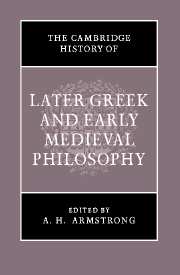Book contents
- Frontmatter
- Chapter 1 Introductory
- Part 1 GREEK PHILOSOPHY FROM PLATO TO PLOTINUS
- Part II PHILO AND THE BEGINNINGS OF CHRISTIAN THOUGHT
- Part III PLOTINUS
- Part IV THE LATER NEOPLATONISTS
- Chapter 17 Introduction to later Neoplatonism
- Chapter 18 Porphyry and Iamblichus
- Chapter 19 Athenian and Alexandrian Neoplatonism
- Part V MARIUS VICTORINUS AND AUGUSTINE
- Part VI THE GREEK CHRISTIAN PLATONIST TRADITION FROM THE CAPPADOCIANS TO MAXIMUS AND ERIUGENA
- Part VII WESTERN CHRISTIAN THOUGHT FROM BOETHIUS TO ANSELM
- Part VIII EARLY ISLAMIC PHILOSOPHY
- Select Bibliography
- Additional Notes and Bibliography
- Index of ancient and medieval works referred to in the text
- General Index
- Index of Greek terms
- References
Chapter 17 - Introduction to later Neoplatonism
from Part IV - THE LATER NEOPLATONISTS
Published online by Cambridge University Press: 28 March 2008
- Frontmatter
- Chapter 1 Introductory
- Part 1 GREEK PHILOSOPHY FROM PLATO TO PLOTINUS
- Part II PHILO AND THE BEGINNINGS OF CHRISTIAN THOUGHT
- Part III PLOTINUS
- Part IV THE LATER NEOPLATONISTS
- Chapter 17 Introduction to later Neoplatonism
- Chapter 18 Porphyry and Iamblichus
- Chapter 19 Athenian and Alexandrian Neoplatonism
- Part V MARIUS VICTORINUS AND AUGUSTINE
- Part VI THE GREEK CHRISTIAN PLATONIST TRADITION FROM THE CAPPADOCIANS TO MAXIMUS AND ERIUGENA
- Part VII WESTERN CHRISTIAN THOUGHT FROM BOETHIUS TO ANSELM
- Part VIII EARLY ISLAMIC PHILOSOPHY
- Select Bibliography
- Additional Notes and Bibliography
- Index of ancient and medieval works referred to in the text
- General Index
- Index of Greek terms
- References
Summary
The philosophers who are the subject of this Part make a sufficiently identifiable group. On the scale of this history all are adherents of Plotinus' version of Platonism although in some cases this may have to be argued and certainly the system was developed in directions which would not all have been approved by Plotinus. The survey runs from Porphyry, who was born in about the year when Plotinus started studying at Alexandria, to the last professors in Alexandria and Greece who were not concerned primarily to apply philosophy to Christian theology—that is from the middle of the third century a.d. to about the end of the sixth.
It is as well to have signposts even if they turn out, as signposts sometimes do, to need a little correcting. A century and a half from Plotinus' death (270) to the middle of Constantine's reign will be dominated by the figures of Porphyry and the Syrian Iamblichus (died 326). Pupils of Iamblichus continued to teach in Syria; but there is almost no trace of their contribution to philosophy; they probably made none. We therefore move to Athens where his influence was also very strong. The School at Athens had a continuous history from Plato, but we know nothing of its philosophy for some time before the great century of Athenian Neoplatonism. This begins with a man called Plutarch towards the end of the fourth century but consists substantially of the trio Syrianus, Proclus and Damascius; in fact their teaching seems sufficiently static for it to be examined only as it appears in Proclus, at least four of whose major works have survived.
- Type
- Chapter
- Information
- Publisher: Cambridge University PressPrint publication year: 1967

